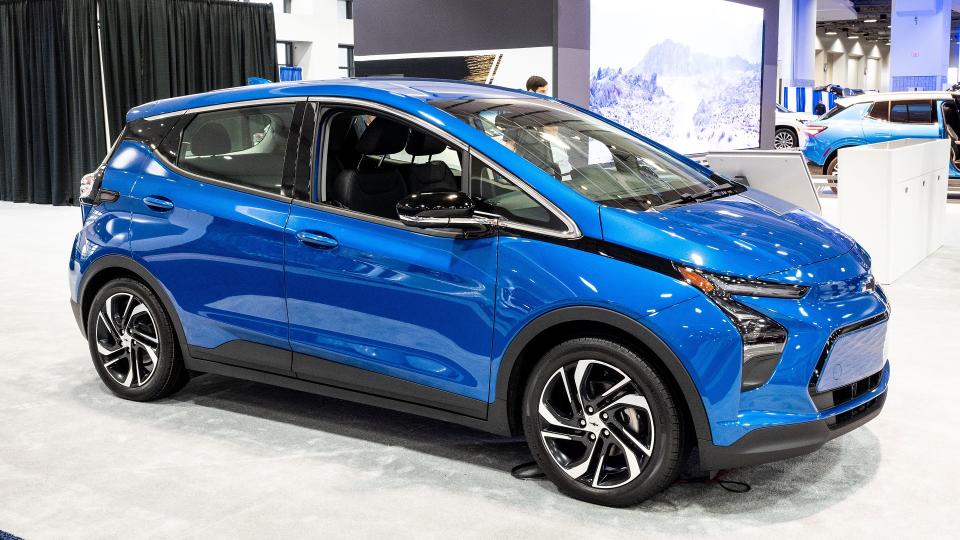Electric Vehicles: These Are the Only 10 Cars That Will Get You a Full Federal Tax Credit in 2024

Considering how prevalent electric cars are going to be in the near future, you would think the rules that determine which of them qualify for the federal electric vehicle (EV) tax credit would be less complicated.
See: 12 Car Brands That Will Break Down Twice as Fast as the Average Vehicle
Find: Pocket an Extra $400 a Month With This Simple Hack
Qualifying for the EV tax credit depends on several factors, including the vehicle’s MSRP (manufacturer’s suggested retail price), its final assembly location, battery component and critical minerals sourcing and the owner’s modified adjusted gross income (AGI).
Over the past year, rules governing vehicle qualification have been revised to address battery size, price caps and vehicle sales limits. However, it looks like there’s only 10 EVs eligible for the full tax credit of $7,500 in 2024.
I’m a Mechanic: Here Are the 6 Best Luxury Cars I Recommend
Which EVs Qualify for $7,500 Tax Credits?
EV incentives restrict qualifying vehicles to American-made electric vehicles or plug-ins with MSRPs of up to $80,000 for SUVs and light duty trucks and $55,000 for smaller cars and sedans. Final assembly of the vehicle must take place in the US, Mexico or Canada.
Additionally, to be eligible for the credit, your household income must not exceed $300,000 for joint filers, $225,000 for heads of households and $150,000 for individuals.
However, the rules supporting North American sourcing critical mineral and battery component requirements that qualify for the tax credit are changing on Jan. 1, 2024. Auto companies are “already scrambling to adjust vehicle and battery production plans so more of their vehicles will qualify,” Cars.com suggested.
The qualification requirements were revised for EVs put into service on Apr. 18, 2023, requiring automakers to manufacture EV battery packs in North America — and to source key battery materials from the U.S., from countries with which the U.S. has free-trade agreements and which are not from “Foreign Entities of Concern” (FEOC). These countries include China, Russia, North Korea and Iran, per The Street.
As of today, $3,750 of the new credit is based upon the vehicle having at least 40% of its battery critical minerals from the U.S. (or countries with a free trade agreement with the U.S.). The other $3,750 of the new credit is based on at least 50% of the battery components of the vehicle coming from the United States.
Starting in 2024, the 40% critical minerals requirement increases to 50%, then 60% in 2025, 70% in 2026 and 80% in 2027. The 50% battery components requirement increases to 60% in 2024 and 2025, 70% in 2026, 80% in 2027, 90% in 2028 and 100% in 2029.
Starting in 2024, vehicles with battery components originating from a FEOC are ineligible for a federal EV tax credit. In 2025, critical minerals — like lithium, nickel, cobalt, manganese and graphite — sourced from a foreign country of concern will be prohibited, per CleanTechnica.
10 Electric Car Models Are Eligible As Of January 1, 2024
Some EVs, like the Ford Mustang Mach-E and Nissan Leaf, are only eligible for a partial credit of $3,750. Used vehicles have a maximum price of $25,000 and can qualify for a maximum credit of $4,000.
And a few models — the Audi Q5, BMW 330, BMW X5, Genesis GV70 and Volvo S60 — no longer qualify for the EV tax credit, according to Consumer Reports.
If you and your car fall under the federal EV tax credit income and price limits, respectively, here are the 10 cars that will get you a full federal tax credit of $7,500 and their MSRPs.
Chevrolet Bolt EV — $26,500
Chevrolet Equinox EV – $48,995
Ford F-150 Lightning — $49,995
Tesla Model 3 Performance — $50,990
Chevrolet Silverado — $51,895
Tesla Model Y Performance — $52,490
Chrysler Pacifica PHEV — $53,425
Chevrolet Blazer EV — $60,215
Cadillac LYRIQ — $58,590
Tesla Model X — $79,990
Federal tax breaks on EVs for select electric cars, plug-in hybrids and hydrogen-powered vehicles that meet government qualifications are guided by the Inflation Reduction Act and an up-to-date list is available via the U.S. Department of Energy’s Office of Energy Efficiency & Renewable Energy site.
If a federal tax credit isn’t available to you, additional state and local rebates and tax incentives are out there to help you save on your electric vehicle purchase.
To claim the credit, you need to attach Form 8936, Qualified Plug-in Electric Drive Motor Vehicle Credit (Including Qualified Two-Wheeled Plug-in Electric Vehicles), to your tax return.
However, keep in mind that if you are planning on claiming the credit upfront in 2024 (starting in January, EV tax credits of up to $7,500 for new clean vehicles and up to $4,000 for used EVs can be applied at the point of sale and can be received directly from dealers), you’ll need to make sure your reported AGI doesn’t top the acceptable limits or you’ll have to repay the full amount of the credit to the IRS.
More From GOBankingRates
The Average American Spends This Much on Rent -- See How You Stack Up
I'm a Self-Made Millionaire: Here Are 5 Stocks I'm Never Selling
This article originally appeared on GOBankingRates.com: Electric Vehicles: These Are the Only 10 Cars That Will Get You a Full Federal Tax Credit in 2024

 Yahoo Finance
Yahoo Finance 